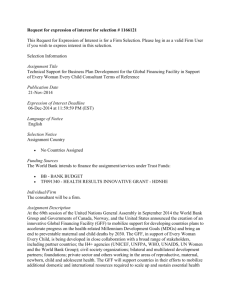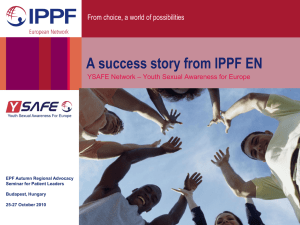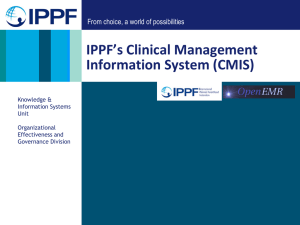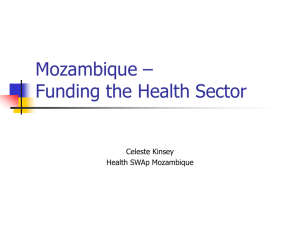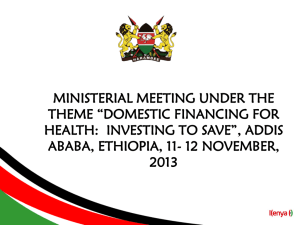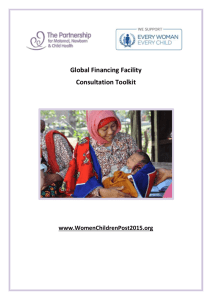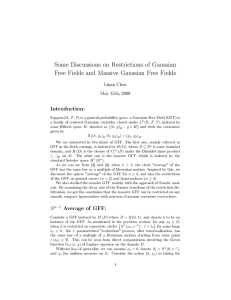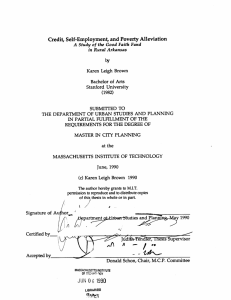Briefing on Global Financing Facility (GFF)
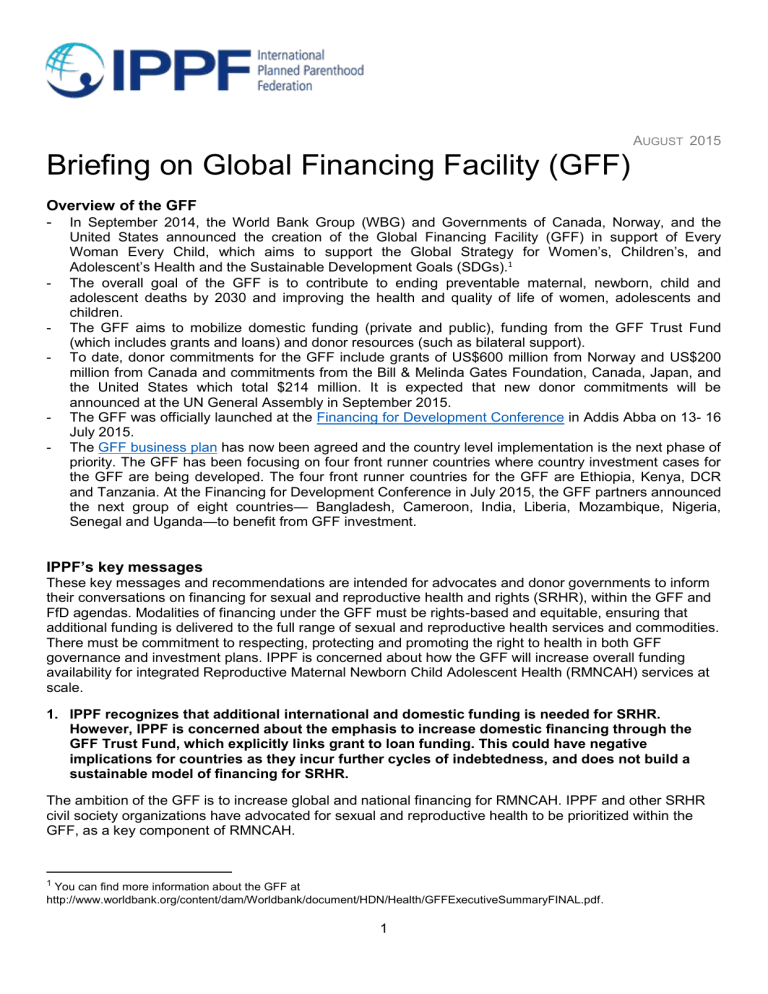
A UGUST 2015
Briefing on Global Financing Facility (GFF)
Overview of the GFF
- In September 2014, the World Bank Group (WBG) and Governments of Canada, Norway, and the
United States announced the creation of the Global Financing Facility (GFF) in support of Every
Woman Every Child, which aims to support the Global Strategy for Women’s, Children’s, and
Adolescent’s Health and the Sustainable Development Goals (SDGs).
1
- The overall goal of the GFF is to contribute to ending preventable maternal, newborn, child and adolescent deaths by 2030 and improving the health and quality of life of women, adolescents and children.
- The GFF aims to mobilize domestic funding (private and public), funding from the GFF Trust Fund
(which includes grants and loans) and donor resources (such as bilateral support).
- To date, donor commitments for the GFF include grants of US$600 million from Norway and US$200 million from Canada and commitments from the Bill & Melinda Gates Foundation, Canada, Japan, and the United States which total $214 million. It is expected that new donor commitments will be announced at the UN General Assembly in September 2015.
- The GFF was officially launched at the Financing for Development Conference in Addis Abba on 13- 16
July 2015.
- The GFF business plan has now been agreed and the country level implementation is the next phase of priority. The GFF has been focusing on four front runner countries where country investment cases for the GFF are being developed. The four front runner countries for the GFF are Ethiopia, Kenya, DCR and Tanzania. At the Financing for Development Conference in July 2015, the GFF partners announced the next group of eight countries — Bangladesh, Cameroon, India, Liberia, Mozambique, Nigeria,
Senegal and Uganda —to benefit from GFF investment.
IPPF’s key messages
These key messages and recommendations are intended for advocates and donor governments to inform their conversations on financing for sexual and reproductive health and rights (SRHR), within the GFF and
FfD agendas. Modalities of financing under the GFF must be rights-based and equitable, ensuring that additional funding is delivered to the full range of sexual and reproductive health services and commodities.
There must be commitment to respecting, protecting and promoting the right to health in both GFF governance and investment plans. IPPF is concerned about how the GFF will increase overall funding availability for integrated Reproductive Maternal Newborn Child Adolescent Health (RMNCAH) services at scale.
1. IPPF recognizes that additional international and domestic funding is needed for SRHR.
However, IPPF is concerned about the emphasis to increase domestic financing through the
GFF Trust Fund, which explicitly links grant to loan funding. This could have negative implications for countries as they incur further cycles of indebtedness, and does not build a sustainable model of financing for SRHR.
The ambition of the GFF is to increase global and national financing for RMNCAH. IPPF and other SRHR civil society organizations have advocated for sexual and reproductive health to be prioritized within the
GFF, as a key component of RMNCAH.
1
You can find more information about the GFF at http://www.worldbank.org/content/dam/Worldbank/document/HDN/Health/GFFExecutiveSummaryFINAL.pdf.
1
However, the emphasis on domestic resources comes with a set of risks and threats to sustainability.
Firstly, IPPF is concerned about the GFF’s emphasis on domestic resources in light of the fact that currently, consumer out-of-pocket payments in developing countries appear to account for the single greatest source of financing for the International Conference on Population and Development (ICPD) costed package.
2 Considering this, IPPF recommends that the GFF’s emphasis on domestic resourcing does not inadvertently increase private out-of-pocket financing for reproductive health services and supplies, particularly for the poorest and most vulnerable populations.
IPPF is concerned about the negative implications of linking grant and loan funding for sustainable financing for SRHR. According to the business plan, the GFF plans to highly “incentivize” IDA and IBRD loans for financing of reproductive, maternal, newborn, child and adolescent health. In order to obtain GFF grant resources, countries will be required to accept four dollars of IDA/IBRD loan financing on average.
This has implications for the conditions of funding that governments enter into, impacting on the sustainability of their financing for health. As grants will be linked to loan financing, this could create future of cycles of indebtedness for governments already struggling to finance core sectors such as health. It is generally accepted that loan/debt financing of annually recurring operating (“current”) costs 3 increases the overall financial burden of those costs and risks undermining economic development unless certain factors are in place. Put simply, as non-concessional loans and market-like instruments are designed to return profits to capital providers, they increase the net cost of development effort, which in turn increases the burden on developing countries. IPPF recommends that in order to ensure that loan/debt financing does not undermine sustainable development, these instruments should be considered generally inappropriate for financing of recurring operating (current) costs, except in clearly specified circumstances, such as if the loan is planned to (a) serve as a bridge that fills a gap in financing due to known/planned donor disbursement delays; (b) with a donor guarantee / pledge backing; and (c) highly concessional in the case of Least Developing Countries (LDCs). IPPF recommends that mechanisms within the GFF should make available sufficient grant assistance to ensure that access to essential reproductive health information, services and supplies is ensured without loan/debt financing of annually recurring operating costs.
2. IPPF recommends that the GFF should cover financing for both targets relating to SRHR currently covered under SDG 3 (Ensure healthy lives and promote well-being for all at all ages) and
SDG 5 (‘Achieve gender equality and empower all women and girls’).
The business plan sets out that the GFF will finance the SDG target on Goal 3 “ Ensure healthy lives and promote well-being for all at all ages ”, but does not propose that GFF funding will also cover goal 5,
‘
Achieve gender equality and empower all women an d girls’
.
This is important as SDG 5 and its related targets will cover the full range of sexual and reproductive health services, as well as reproductive rights, covered under the ICPD Programme of Action costed package, which is broader than what is currently included in SDG 3. IPPF recommends that the GFF is linked to the range of targets included under SDGs 3 and 5, as solely linking the GFF to indicators under the relevant
SDGs could lead to the financing of a narrower range of services covered only by the given indicator (e.g. met need satisfied by modern contraceptives). IPPF recommends that the GFF financing is linked to
2 Compernolle, L., Hoehn, K., Koenig, S. (April 2015) Post-2015 Financing for reproductive Health Supplies, Rapid Assessment-
Advocacy Mapping.
The ICPD costed population package includes: family planning services, reproductive health services, STI/HIV/AIDS activities and basic research, data and population and development policy analysis.
3 World Bank / International Development Association (IDA) loans reported in the OECD DAC database under Population
Assistance sector coding frequently indicate coverage of annually recurring, operating “current” costs, including:
Information-education-communications activities
Control of communicable and non-communicable diseases
Health surveillance and promotion activities
Hospital/other health and nutrition services, support services
Health policy reform
Capacity building
Health care practitioner training
Strengthening of personnel recruitment and management
2
the targets under both the SDGs 3 (Ensure healthy lives and promote well-being for all at all ages) and SDG 5 ( ‘girls’).
3. IPPF recommends that civil society must have a role in the creation and validation of national plans and financing maps, and have a strong role in ensuring accountability.
Civil society must be included in the creation of national investment cases and health financing strategies, as well as in the development and validation of financing plans.
Civil society must have a role in any subsequent follow-up and monitoring processes, and should be given the space and resources to undertake an independent monitoring role, tracking the implementation of the GFF at national and global levels and holding governments and the donor community to account when they fail to deliver. Although the business plan mentions engagement with civil society, there is a need for an operational model that formalizes the engagement of civil society (including in planning, implementation and evaluation at the national level) and ensures this is consistent and meaningful.
The business case states that the investment case is subject to a quality assurance processes that involves an independent review, including international experts to ensure that issues, such as family planning, and populations, such as adolescents, that have historically seen underinvestment are included in investment cases. Much hinges on this review group and more detail is required to understand who will be on the review group and whether civil society, in particular, will be included and supported financially to participate in this group as part of its role in ensuring accountability. The GFF business plan acknowledges that despite evidence of their cost-effectiveness, reproductive health and groups such as adolescents have been neglected in past investments in health. IPPF recommends that there are mechanisms to ensure their inclusion in national investment plans.
IPPF’s recommendations
IPPF is concerned about the emphasis to increase domestic financing through the GFF Trust
Fund, which explicitly links grant to loan funding. This could have negative implications for countries as they incur further cycles of indebtedness, and does not build a sustainable model of financing for SRHR.
IPPF recommends that the GFF’s emphasis on domestic resourcing does not inadvertently increase private out-of-pocket financing for reproductive health services and supplies, particularly for the poorest and most vulnerable populations.
IPPF recommends that in order to assure that loan/debt financing does not undermine sustainable development, loans should be considered generally inappropriate for financing of recurring operating (current) costs, except in clearly specified circumstances. Rather, IPPF recommends that mechanisms within the GFF should make available sufficient grant assistance to ensure that access to essential reproductive health information, services and supplies is ensured without loan/debt financing of annually recurring operating costs.
IPPF recommends that the GFF should cover financing for targets relating to SRHR under SDG
3 (Ensure healthy lives and promote well-being for all at all ages) and SDG 5 (‘Achieve gender equality and empower all women and girls’).
IPPF recommends that civil society must have a formalized role in the creation of national plans and financing maps, and have a strong role in ensuring accountability.
-
About us:
The International Planned Parenthood Federation (IPPF) is a global service provider and leading advocate of sexual and reproductive health and rights for all. We are a worldwide movement of national organizations working with and for communities and individuals. More detailed information is available from IPPF. Please contact: psundaram@ippf.org
3
